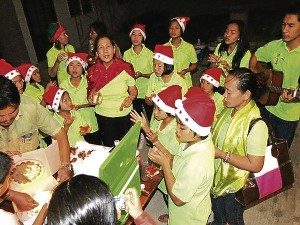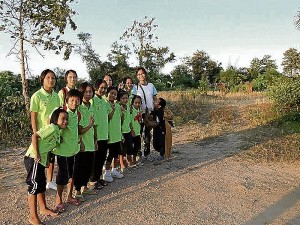
FILIPINO missionaries Ma. Nelma Amihan (center, with the scarf) and Gigi Callao (second from right) went caroling with refugee children last Christmas.
MAE SOT, Thailand—Watching the children run and play in the rice fields reminds me of my hometown in the Visayas. But I am thousands of miles away from home. This is a small town on the Thai-Burma border.
Three Filipino women explain to me that the children, unlike the playful neighborhood kids back home, are refugees. They come from different families and different ethnicities. They arrived in Mae Sot at different times, in different ways. Some arrived with their parents. Some were born there. Some drifted alone in boats and rafts down the Moie River—apparently set adrift by their parents with dreams of better lives for them beyond the border.
These refugee children are part of the toll of the long civil war in Burma (Myanmar).
Mae Sot is only a 15-minute walk from Myawaddy, Burma, passing through a “Friendship Bridge” that separates the two neighboring countries. Thailand grants legal workers and traders special day passes to Mae Sot. In the afternoon, they cross back to Burma. Some refugees are recognized but their movements are limited. Illegal migrants, however, are imprisoned for four days (if caught) then deported back to Burma. Some of these illegal migrants tell stories of exploitation and abuse. But this apparently does not deter them from coming back, escaping poverty and other forms of discrimination under the Burmese military junta.
The release of Aung San Suu Kyi from house arrest last year was good news for many of the refugees. But it has not so far changed their situation. The influx of migrants to this border down continues.
Answering God’s call
The three Filipino women I met, however, know no borders in putting these children’s dreams together. They are missionaries. They helped build a school, a church and are helping run an orphanage and a girls’ home. They live on meager missionary allowances, but all say they are here, and choose to stay with the migrants because of “God’s call.”
Maria Nelma S. Amihan, fondly called Papet, came here in 2000 and speaks Thai fluently. She is a respected personality in Mae Sot because of her dedication and commitment to help the migrants.
She relates: “Actually, I did not want to be a missionary. I only heard in one women’s gathering that in Burma a woman could not hang her clothes in the same clothesline as the men. I felt offended. So I said, one day I will go to Burma. When a Missions director asked me where would I want to go if I ever become a missionary, I answered: Burma.”
Her becoming a missionary was a big surprise to her family and friends. Coming from a well-off family in Western Visayas, she had a thriving career as a medical representative. One day, she told them, that she would be a missionary and a week after that, she was training to become one. It happened so fast. She explains: “I did not choose to become a missionary. God chose me.”

THE AUTHOR (standing first from right) with staffers and children of the Faith Haus, a shelter for migrant girls
Papet did not make it to Burma, which is closed to missionaries. Instead, she was sent to Mae Sot, where she works closely with the migrants from Burma.
Elpis means hope
Another Filipino missionary is Roselyn Sanchez. A native of La Carlota, Negros Occidental, Roselyn studied to become a missionary at Asian Center for Missions in the Philippines. She came to Mae Sot in 1999.
She and Papet helped set up the Elpis School. It started as a feeding program for the migrant children. The two Filipino women, together with Pastor John Srivichai, a Thai Pastor, and Heihtoo, a Karen, formally founded the school in June 2003 under the Foursquare Church of Mae Sot. It caters to Burmese migrant children who have no hope of getting an education in Thailand.
True to its Greek meaning (hope), Elpis School is giving hope to displaced migrant children. Presently, there are 429 students at Elpis.
In the beginning, the school faced many difficulties, the women retell. There was enormous paper work required to get it registered, and then there was the problem of funding. Elpis School funds come from the support of their churches in the Philippines—the Southern Baptist and Convention Baptist church organizations.
Other missionaries heard about their work and sent money and their own pastors from Singapore and Malaysia to help. Other Foursquare churches also pitched in. Friends and individuals also send financial help to cover growing expenses, they say.
The girls’ ‘haus’
The three women also helped open the Faith Haus, a shelter for migrant girls. Presently, there are 13 girls ranging from age 16 to 7.
A third Filipino missionary, Gigi Callao is in charge of this shelter. Gigi is from Davao and has been in Mae Sot for four years now.
“It is difficult to handle 13 girls, with different moods and, of course, from different ethnic backgrounds; Burmese, Karen and Karennis. Thank God, I can handle them. Buti na lamang at mura ang supplies dito sa Thailand (it is good that the supplies here in Thailand are cheap), we can manage our day-to-day existence,” she says. Still, Faith Haus is always in need of supplies to support the increasing needs of the girls, she relates.
“The girls can stay here as long as they want to change their lives for the better,” she says with a smile.
As a livelihood project to financially support the school and the shelter, Blessing Center and Coffee Shop was opened in 2009. Roselyn, aside from being the administrator and teacher at Elpis, is in charge of the shop. It is also a display center for arts and crafts.
Persecution and struggle
Yet, mission work is always a struggle, says Papet.
“We experienced persecution when we first started with the work. The police came running after us because we work with migrants and “illegals.” We were ejected twice from houses we rented. It was really painful. We were looked down on because we always walk with the lowly and the Burmese. But now we are used to it and God has given us victory. In fact, we now work with the government in their English education projects.
“It is difficult at the beginning. Pioneering work is not easy but if people see your faithfulness and persistence, if you show them you can be trusted with the work and finances, many people will eventually come to support, help and encourage you,” she adds.

